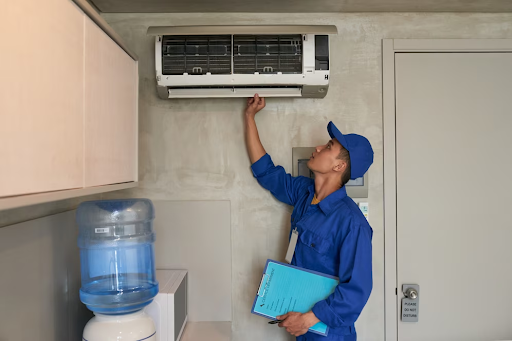As the scorching heat of summer intensifies, the last thing anyone wants is for their air conditioning system to fail. A malfunctioning AC unit during a heatwave can turn a comfortable home into an unbearable sauna. In times of crisis, knowing how to handle emergency AC repair becomes crucial. This guide aims to equip you with the necessary knowledge to troubleshoot common issues and, when needed, summon professional help.
Common AC Problems
No Cooling:
- Check the thermostat settings to ensure it’s set to the desired temperature.
- Inspect the air filter and replace it if it’s dirty, as a clogged filter can restrict airflow.
- Examine the outdoor unit for debris or vegetation that may be blocking airflow.
Poor Airflow
- Dirty or blocked air filters are a common culprit. Replace or clean them regularly.
- Inspect the ductwork for any obstructions or leaks that may hinder airflow.
Strange Noises
- Rattling, squealing, or banging noises may indicate loose or damaged components. Turn off the AC and inspect the unit for visible issues.
- Grinding noises could signal a problem with the motor bearings, requiring immediate attention.
Leaking Water
- A clogged condensate drain line or a malfunctioning condensate pump can lead to water leakage. Clear the blockage or consult a professional for assistance.
Unit Not Turning On
- Ensure that the thermostat batteries are functional.
- Check the circuit breaker to see if the AC circuit is tripped. Reset it if necessary.
Emergency DIY Steps
Check Thermostat Settings:
Verify that the thermostat is set to the desired temperature and the fan is on the “auto” setting.
Inspect Air Filters:
Examine and replace dirty or clogged air filters to improve airflow and efficiency.
Clear Debris:
Remove any leaves, branches, or debris obstructing the outdoor unit’s airflow. Keep the area around the unit clean and unobstructed.
When to Call a Professional
While some AC issues can be resolved with basic troubleshooting, certain problems require the expertise of a professional HVAC technician. Consider calling for emergency AC repair if:
Refrigerant Leaks:
Refrigerant leaks pose health risks and require immediate attention from a certified technician.
Electrical Issues:
A professional should handle problems with the electrical components, such as faulty wiring or a malfunctioning capacitor.
Compressor Failure:
If the compressor is not functioning, it’s a serious issue that requires specialized knowledge and equipment.
Strange Smells:
Unusual odors, especially burning smells, may indicate electrical or mechanical issues that need professional assessment.
Repeated Breakdowns:
If your AC unit experiences frequent breakdowns, it may be a sign of underlying issues that require a comprehensive inspection by a professional.
Regular Maintenance for Prevention
While emergency AC repairs are essential in times of crisis, adopting a proactive approach through regular maintenance can significantly reduce the likelihood of sudden breakdowns. Schedule annual professional inspections to identify potential issues before they escalate. During these check-ups, technicians can assess refrigerant levels, clean coils, tighten electrical connections, and ensure all components function optimally. Also, don’t underestimate the importance of regular DIY maintenance tasks like cleaning or replacing air filters. A well-maintained AC system operates more efficiently and enjoys an extended lifespan, saving you from the stress and inconvenience of unexpected malfunctions.
Investing in Smart Technology
Advancements in technology have introduced smart HVAC systems that offer enhanced control, energy efficiency, and diagnostic capabilities. Consider investing in a smart thermostat that allows you to monitor and adjust your home’s temperature remotely. Some models even provide real-time insights into your system’s performance, notifying you of potential issues before they become critical.
Effective commercial HVAC installation is crucial for businesses, requiring precision in designing and implementing heating, ventilation, and air conditioning systems tailored to diverse needs. Professional installation guarantees optimal climate control and energy efficiency for expansive office complexes or industrial facilities.
Conclusion
As temperatures soar, a malfunctioning AC system can quickly turn your home into an uncomfortable and potentially dangerous environment. By familiarizing yourself with common AC problems and taking proactive measures, you can address minor issues and prevent major breakdowns. Remember, when in doubt or faced with complex problems, it’s always best to seek the expertise of a qualified HVAC technician for emergency AC repair. Stay cool and prepared for whatever the summer heat throws your way!

